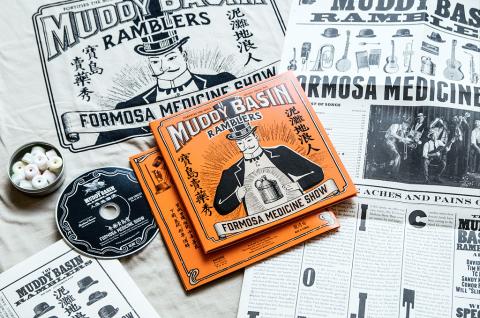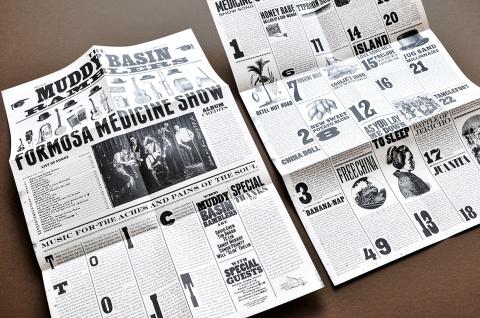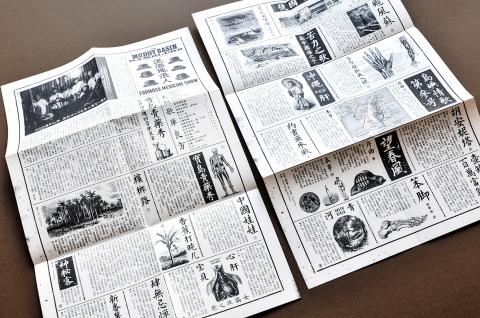Muddy Basin Rambler fans and the swing dance community are polishing their spats and practicing their steps ahead of the band’s concert at a Christmas party at the Mega City shopping mall in New Taipei City’s Banciao District (板橋) on Tuesday.
The six-man group which was formed a decade ago, has been busy this year promoting their second CD, the 23-song double album Formosa Medicine Show, which was released in October last year, and making plans to begin recording a new one next spring.
However, front man David Chen (陳思銘) — a former Taipei Times features writer — and his band mates have another reason to feel like partying — not that they ever need much of an excuse.

Photo Courtesy of the Muddy Basin Ramblers
Chen and Andrew Wong (黃家賢), director of Onion Design Associates (洋蔥設計), were nominated on Dec. 5 as art directors for a Grammy for Best Recording Package for the Formosa Medicine Show.
It was a bit of Christmas-come-early for both men, although they will have to wait until Feb. 8 to find out the results.
It is the sixth time that Taiwan-based designers have been nominated for their album packaging, though none have won. Xiao Qing-yang (蕭青陽) has been been nominated four times and Cheng Szu-wei (鄭司維) once.

Photo Courtesy of Andrew Wong
The Hong Kong-born Wong, who studied graphic design, typography and art history at the University of Houston, Texas, established his Taipei-based design studio in 2000 with partner Janett Wang.
Onion Design lists several of the nation’s top cultural institutions among its clients, including Cloud Gate Dance Theatre (雲門舞集), the National Palace Museum and the Junming Museum, as well as big corporate names.
Wong said he was shocked to learn of his nomination.

Photo Courtesy of Andrew Wong
“I didn’t believe it at first and didn’t expect it at all,” he said.
However, the designer is not feeling optimistic — perhaps because he and colleague Yang Fong-ming (楊豐銘) were in the running for a Golden Melody Award for best packaging for the CD back in June and did not win, or perhaps because Xiao and Cheng failed to win when they were nominated for Grammys.
Wong also noted that he and Chen are up against some tough competition, including albums by Pearl Jam, Passenger, FKA twigs and the Pixies.

Photo Courtesy of Andrew Wong
The latter’s CD, Indie Cindy, was done by "the legendary designer Vaughan Oliver, who did tons of 4AD [an independent label] classic records in the 1980s and 1990s,” Wong said.
He added that it would be nice to win and “bring back the trophy.”
Chen, who had filled out all the forms to apply for the Grammy awards back in August — something he credits his wife, Robyn, for pushing him to do — said he was equally shocked to learn from a friend on Facebook that the CD had actually been nominated.
“I had just woken up and was checking my messages, all groggy-eyed, and the person had written to say congratulations. I was like, for what? I saw ‘Grammy’ in the message and then it dawned on me. So I quickly went to the Grammy Web site to check, my heart racing. And there it was,” he said.
He said the main reason he applied was it was a way of thanking Wong.
“We thought his work was just so awesome and we wanted to help him out as much as possible, as he was so generous with his time and basically charged us a very low fee to do the work,” Chen said. “This accolade really belongs to him, and truly reflects on him and his team.”
Chen and Wong are not the only Taiwan-based artists who are looking forward to the Grammy ceremony. New Taipei City-based Wind Music (風潮音樂) is up for Best World Music Album, along with Los Angeles-based Daniel Ho Creations, for Our World in Song by Chinese pipa virtuoso Wu Man (吳蠻), Luis Conte and Daniel Ho.
The songs for Formosa Medicine Show, most of which were written by Chen, tell stories about hucksters, vagabonds and itinerant musicians traveling in Taiwan and elsewhere in Asia from the early 1900s to the 1950s. The musical styles include traditional blues, US hillbilly music, ragtime and swing jazz, although the band also included a cover of the Taiwanese classic, Wang Chun Feng (望春風).
To help capture an “old time” sound, the band used a vintage, RCA-style microphone from the middle of the last century and radio equipment from the 1930s.
The design is in keeping with newsprint publicity materials used by traveling minstrel and medicine shows in the US in the late 19th and early 20th centuries that pedaled “patent medicines” and folk cures in rural areas.
In addition to the Ohio-born Chen, who has been in Taipei since 1997, the band includes five other long-terms expatriates: Tim Hogan on washboard and percussion; TC Lin on washtub bass, baritone and trumpet; Sandy Murray, on ukulele and tenor and soprano saxophones; Conor Prunty on harmonica, washtub bass and ukulele; and Will Thelin on jug, kazoos, trombone and vocals.
The subhead has been corrected since the story was first published to reflect that it was the album designers, not the band itself, who were nominated for a Grammy.

The primaries for this year’s nine-in-one local elections in November began early in this election cycle, starting last autumn. The local press has been full of tales of intrigue, betrayal, infighting and drama going back to the summer of 2024. This is not widely covered in the English-language press, and the nine-in-one elections are not well understood. The nine-in-one elections refer to the nine levels of local governments that go to the ballot, from the neighborhood and village borough chief level on up to the city mayor and county commissioner level. The main focus is on the 22 special municipality

The People’s Republic of China (PRC) invaded Vietnam in 1979, following a year of increasingly tense relations between the two states. Beijing viewed Vietnam’s close relations with Soviet Russia as a threat. One of the pretexts it used was the alleged mistreatment of the ethnic Chinese in Vietnam. Tension between the ethnic Chinese and governments in Vietnam had been ongoing for decades. The French used to play off the Vietnamese against the Chinese as a divide-and-rule strategy. The Saigon government in 1956 compelled all Vietnam-born Chinese to adopt Vietnamese citizenship. It also banned them from 11 trades they had previously

Hsu Pu-liao (許不了) never lived to see the premiere of his most successful film, The Clown and the Swan (小丑與天鵝, 1985). The movie, which starred Hsu, the “Taiwanese Charlie Chaplin,” outgrossed Jackie Chan’s Heart of Dragon (龍的心), earning NT$9.2 million at the local box office. Forty years after its premiere, the film has become the Taiwan Film and Audiovisual Institute’s (TFAI) 100th restoration. “It is the only one of Hsu’s films whose original negative survived,” says director Kevin Chu (朱延平), one of Taiwan’s most commercially successful

Jan. 12 to Jan. 18 At the start of an Indigenous heritage tour of Beitou District (北投) in Taipei, I was handed a sheet of paper titled Ritual Song for the Various Peoples of Tamsui (淡水各社祭祀歌). The lyrics were in Chinese with no literal meaning, accompanied by romanized pronunciation that sounded closer to Hoklo (commonly known as Taiwanese) than any Indigenous language. The translation explained that the song offered food and drink to one’s ancestors and wished for a bountiful harvest and deer hunting season. The program moved through sites related to the Ketagalan, a collective term for the